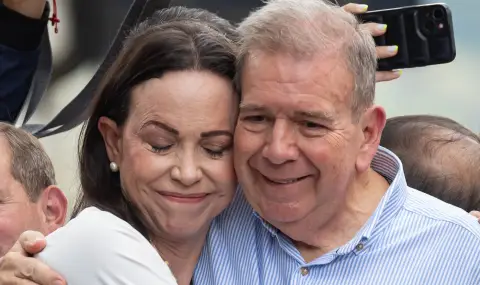The leader of the democratic forces of Venezuela and the opposition candidate in the presidential elections in July were awarded the “Sakharov” for freedom of thought for 2024
The President of the European Parliament Roberta Mezzola announced the laureate of the “Sakharov“ for freedom of thought for 2024 in the plenary hall in Strasbourg on Thursday, after the meeting of the Council of Presidents of the Parliament during which the decision was taken.
President Metzola stated: “The “Sakharov“ for Freedom of Thought 2024 is awarded to María Corina Machado and President-elect Edmundo González Urrutia for their courageous struggle to restore freedom and democracy in Venezuela. In their quest for a fair, free and peaceful transfer of power, they fearlessly defended the values that millions of Venezuelans and the European Parliament hold dear: justice, democracy and the rule of law. The European Parliament supports the people of Venezuela, as well as María Corina Machado and Edmundo González Urrutia, the President of Venezuela recognized by the European Parliament, in their struggle for a democratic future for their country. This award is for them“.
Maria Corina Machado was the chosen 2023 presidential candidate of the Venezuelan opposition on behalf of the “Democratic Platform for Unity”, but was later disqualified by the National Electoral Council, which is controlled by the country's political regime.
Edmundo González Urrutia, a diplomat and politician who replaced her as the Democratic Platform for Unity presidential candidate, condemned the failure of the Venezuelan government to publish official results of the presidential election and disputed the declared victory of Nicolas Maduro. Mr. González Urrutia left the country in September after a warrant was issued for his arrest.
In a resolution adopted on 19 September 2024, members of the European Parliament stressed that the reports of international election observation missions clearly stated that the presidential elections in Venezuela were not conducted in accordance with international integrity standards of the elections. They recognized Edmundo Gonzalez Urrutia as the legitimate and democratically elected president of the country, and María Corina Machado as the leader of the democratic forces.
Parliament condemned “electoral fraud“ and the serious and systematic human rights violations committed against the democratic opposition, the Venezuelan people and civil society.
According to data from the Venezuelan government, 2,400 people were arrested during the post-election demonstrations, and non-governmental organizations reported the death of 24 people. María Corina Machado continues to hide, and Edmundo González Urrutia fled to Spain, which granted him political asylum on September 7.
In its September 2024 resolution, Parliament called on the EU to extend sanctions against the Venezuelan regime and to impose targeted sanctions through the EU's Global Sanctions Regime for serious human rights violations against Nicolás Maduro and his inner circle. Ahead of the elections, the European Parliament called on member states to maintain sanctions against the Maduro regime and criticized the unconstitutional decision to bar prominent members of the political opposition, such as María Corina Machado, from running in the 2024 elections.
The ceremony of awarding the “Sakharov“ for freedom of thought will take place on December 18 during the plenary session of the Parliament in Strasbourg.
The “Sakharov“ for freedom of thought named after Soviet physicist and political dissident Andrei Sakharov is the EU's highest honor in the field of human rights. Established in 1988, the prize is awarded annually by the European Parliament to individuals and organizations in recognition of their work in one of the following areas: protection of human rights and fundamental rights, in particular freedom of expression, protection of the rights of minorities, respect for international law, the development of democracy, as well as the protection of the rule of law.
